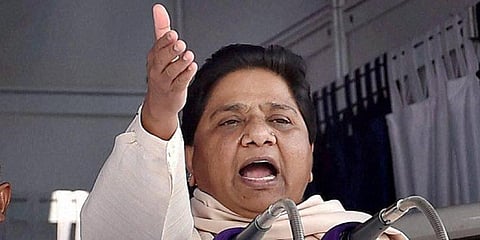

LUCKNOW: From a school teacher who wanted to be an IAS officer to becoming the chief minister of Uttar Pradesh four times, Mayawati's journey has inspired many, particularly in the Dalit community.
But the Bahujan Samaj Party leader has been out of power in UP for a decade, and a better showing in the just-ended assembly elections would have come in handy.
Instead, the BSP was leading on just a single seat on Thursday evening.
In the run-up to the Uttar Pradesh elections, her critics accused Mayawati of missing from the campaign scene, a charge she repeatedly denied.
Some called her low-key involvement deliberate, claiming that she was the B-team of the ruling BJP.
A spot of praise by senior BJP leader Amit Shah about her relevance in state triggered more speculation of a possible tie-up between the BJP and the BSP once the results are declared.
In any case, the ruling BJP has romped home again in the state on its own.
Leading the party floated in 1984 by Kanshi Ram, Mayawati became the chief minister in UP for the first time in 1995.
But her big success came in 2007 with the BSP's social engineering that brought together Brahmins, Dalits and Muslims.
Born in a modest-income family in Delhi in 1956, Mayawati did her graduation from Delhi University's Kalindi College in 1975, and took up a teacher's job.
But she dreamt of becoming an IAS officer.
After enrolling for an LLB course in Delhi University's Campus Law Centre, she was prepping for the Civil Services exam in 1977 when a chance meeting with Kanshi Ram, who then headed the All India Backward and Minority Communities Employees Federation, changed the course of her life.
Encouraged by him to join politics, she soon became an integral part of the party floated by Kanshi Ram.
In 1997 and in 2002, she became chief minister with outside support from the Bharatiya Janata Party (BJP).
Her government lasted just months the first three times she was in power.
In 2007, she became chief minister on her own steam.
Mayawati gained a reputation of being a no-nonsense leader, particularly on law and order.
She reaffirmed her reputation in 2007, when her party MP Umakant Yadav, accused in a land-grabbing case, was arrested near her home on her orders.
She claims that several high-profile criminals and mafia dons landed behind bars during her terms in office.
Controversies have dogged her career.
Fundraising efforts on behalf of her party, her birthday celebrations, naming districts after Dalit icons and changing the landscape of Lucknow by installing monuments and memorials drew sharp comments from rivals.
Rivals repeatedly levelled charges of corruption against her.
Her electoral fortunes nosedived after being voted out of power in 2012.
Things did not change when she joined hands with rival Samajwadi Party in 2019 Lok Sabha elections.
Yet the 66-year-old leader appeared to hold on to her core Dalit base in UP.
Even in the just-ended elections, she has a vote share of about 13 per cent.
In her near absence this time during the early phase of the campaign, when she connected with voters only through her tweets, her close confidant Satish Chandra Mishra stepped in.
Mishra is credited with roping in the upper castes for the BSP, helping with the social engineering of the kind that brought her the big 2007 victory.
But the attempt fell way short this time.